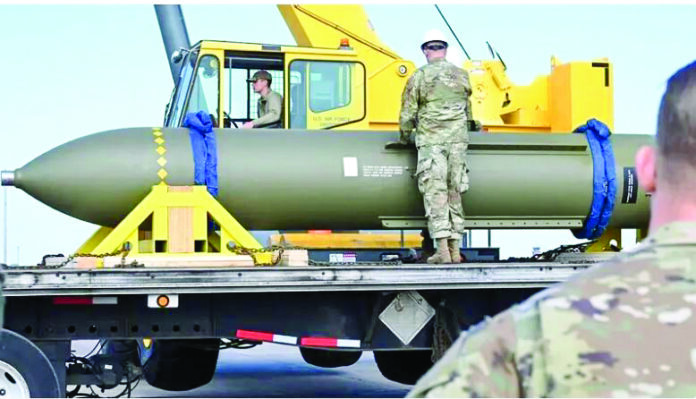Tensions rise as President Trump escalates military presence in the Middle East, signalling a potential conflict with Iran over nuclear ambitions.
LONDON: As the world became fixated on Donald Trump’s surreal chart-waving performance in the White House Rose Garden last Wednesday and the impending trade war, another war is looming; a military conflict which could be hugely more serious. Just before he spoke, Trump ordered the move of a second aircraft carrier to the Middle East, amid fears that he may be gearing up to strike Iran. From its normal patrol area in the South China Sea, the USS Carl Vinson began its journey to the Persian Gulf, where it will join its sister carrier USS Harry S Truman, possibly as early as next Wednesday. The White House has already moved six B-2 Spirit stealth bombers, a third of its fleet, to the Diego Garcia military base on the UK-controlled Chagos Archipelago. These high-tech planes can carry bunker-busting bombs, the kind necessary for the destruction of deep nuclear sites developed over the years by Iran. Also spotted by satellite imagery last week was a fleet of six Stratotanker in-flight refuelling aircraft. These would give the B2s the capability of flying to Iran, deliver their payloads and return to the Diego Garcia base, a five thousand mile trip. All this suggests that Trump is serious about getting Iran to give up its nuclear ambitions – by force if necessary.
On 12 March this year, President Trump sent a letter to Iran’s supreme leader, Ayatollah Ali Khamenei, expressing interest in a new nuclear deal. The content of the letter, delivered to Iranian Foreign Minister Abbas Araghchi by an Emirati official, has not been made public, but in a later interview with Fox News Trump disclosed that he had told the Iranian leader that he hoped they would negotiate about a deal “because if we have to go in militarily it’s going to be a terrible thing.” This was a classic pre-negotiation threat by Donald Trump, which was met with the expected response from Khamenei that “Iran is not interested in talks with a bullying government”, describing the missive as “an attempt to deceive global public opinion”. Khamenei also added that the US threat was “irrational” and warned that “Iran is capable of delivering a reciprocal blow”. Later, on 29 March, Iran’s President Masoud Pezeshkian struck a more moderate tone, saying that while “Iran rejected the possibility of direct talks with the US, the path for indirect talks remains open”. Addressing his cabinet last Sunday, Pezeshkian emphasised that “Iran has never avoided negotiations”.
Donald Trump, however, remains in his traditional “maximum pressure mode”, warning in an interview last Sunday with NBC News of a possible attack on Iran. “If they don’t make a deal, there will be bombing”, he said. Although it’s unclear what has provoked Trump’s heightened language, the risks of direct confrontation have intensified rapidly in the past month. Washington has launched increasing military strikes against Iranian-backed Houthis in Yemen, following their continued maritime attacks on commercial shipping and US naval vessels in the Red Sea. Trump may have also had in mind last month’s report by the International Atomic Energy Agency that Iran has substantially expanded its production of highly enriched uranium and is further increasing its stockpile of near-weapons-grade material, shortening the time it would need to produce a nuclear device. Curiously, this report appeared to contradict the testimony given to the US Senate last week by Tulsi Gabbard, the recently appointed Director of National Intelligence. Gabbard stated that the US intelligence community “continues to assess that Iran is not building a nuclear weapon and Khamenei has not authorised the nuclear weapons programme that he suspended in 2003”. With such ambiguity, why is Donald Trump so determined to raise and resolve the Iran nuclear issue?
The answer probably lies in the developing pressure from Israel, whose government is currently on a high having recently removed much of Iran’s “axis of evil” from around its borders. “Iran’s nuclear programme should have been dealt with a long time ago”, a senior Israeli source warned recently. Israeli officials remain convinced that Teheran will be in a position to enrich enough Uranium 233 to produce several fission weapons by the end of this month and that action is urgently needed. A senior Israeli politician in Jerusalem told a UK newspaper, the Sun, that “it is more important now than ever to stop Khamenei’s nuclear ambition”, adding that “it’s not just crazy insistence, it’s extremely important for the stability of Israel and the world. The whole world should make an effort to make sure that Iran is restrained”. An Israeli diplomatic source who wished to remain anonymous said that “with Trump in the White House, this represents the optimum moment to deal with Iran. There won’t be a better chance”. For months Israel has been clearing the path for a major strike on Iran. An IDF insider claimed that as Israel had significantly downgraded the threat posed by Hamas in Gaza, Hezbollah in Lebanon, and the Houthis in Yemen, Iran is now effectively isolated. Also, he argued, the three air campaigns which Israel carried out against Iran in the past year eliminated most of Iran’s aerial defence system, leaving the nuclear facilities currently exposed.
Commenting on President Trump’s letter to Khamenei, Shelly Tal Meron, a member of Israel’s parliament, the Knesset, summed up the feeling in the country. “Teheran is the head of the snake”, she said, “Israel cannot afford for Iran to have nuclear weapons. I think the world is waking up to this reality and understanding that the Iranian regime is not only a problem for the State of Israel, but other countries as well”. Acknowledging Trump’s wish to first have a dialogue with Teheran, Shelly added “I think President Trump is very involved in that. He said himself that he prefers talk and not war. Of course, I agree. It’s always better to solve things through diplomacy, but Israel may have no other choice but to directly stop Iran’s nuclear weapons development if talks fail”.
Teheran has stepped up its rhetoric against the US in recent weeks, repeatedly threatening American bases across the Middle East. On Monday, Khamenei warned that any move by the US or Israel would bring a “crushing and decisive blow against the Zionist state”. In a follow up, Brig. Gen. Amir Ali Hajizadeh, commander of the aerospace division of Iran’s Islamic Revolutionary Guard Corps, threatened attacks on US military installations. “The Americans have 10 bases in the region, particularly around Iran”, he said, referring to US air and naval bases in the Arabian Peninsula, including US forces in Iraq, Jordan, and Syria. “This means they are sitting in a glass house, and when one sits in a glass house, one does not throw stones at others”. Reports emerging from Teheran last week suggest that senior commanders have been urged to launch a pre-emptive strike on the Diego Garcia base, as a result of Trump’s intimidations.
Such threats are unlikely to stop America or Israel from taking action against Iran in the next few weeks, unless Teheran unexpectedly yields to Trump’s demands. The Israeli lobby is extremely powerful in America – some insiders argue that it even determines America’s foreign policy. As a result, American presidents, even Donald Trump, ignore the wishes of the Israeli lobby at their peril. Currently it is urging the president to take action against Iran, reminding Trump that the “promised land” remains traumatised by grief, guilt and fear from the vicious attack on its innocent citizens by Iran’s terrorist group, Hamas, almost 18 months ago. The ruling hardliners in the Knesset are also reminding Trump that they strongly support a reckoning with their enemies in Teheran.
So, the bombers in Diego Garcia are primed and ready to go, as will be the two aircraft carriers in a few days. Trump’s tariff induced trade war might be a mere side-show. The real war, the bombing of Iran, is possibly imminent.
* John Dobson is a former British diplomat, who also worked in UK Prime Minister John Major’s office between 1995 and 1998. He is currently a visiting fellow at the University of Plymouth.








